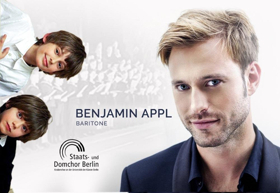Berlin Boys Choir and German Soloist Benjamin Appl Join The Bach Choir For End Of WWI Centenary Concert

The internationally famous Bach Choir will be joined by the Staats- und Domchor Berlin and German soloist Benjamin Appl to commemorate the end of WW1 with a performance of Benjamin Britten's War Requiem at Westminster Cathedral on Wednesday, October 3rd.
In the run up to the concert a number of the 300 singers in The Bach Choir have spoken on video of their own family memories of brothers, fathers and uncles who took part in the conflict, many never to return.
David Hill, Musical Director of The Bach Choir said: "I am delighted that boys from the Staats- und Domchor Berlin are joining forces with choristers from Westminster Cathedral for this very special event. German Baritone Benjamin Appl is a rising star and the last person to study with Dietrich Fischer-Dieskau, possibly the world's greatest Lieder singer, and the baritone Britten chose for the premiere performance and recording. We present this as a concert of unity, after the terrible divide of 100 years ago."
For the first performance of the War Requiem in 1962 Britten engaged three soloists, one British, one Russian and one German (the Russian soprano was unable to travel at the last moment, but was present for the later recording). The Bach Choir sang on the first recording of the piece, conducted by Britten himself, still the seminal recording today. https://www.deccaclassics.com/gb/cat/4757511)
For the forthcoming concert by The Bach Choir on October 3 the same spirit of unity which characterized the first performance 56 years ago will once more be on display with the Staats- und Domchor Berlin, and baritone Benjamin Appl, joining The Bach Choir.
When war was declared in 1939, Benjamin Britten was living in the USA, having moved there earlier that year. He was already known for his strong anti-war beliefs; his first public statements of his pacifism, through his music, were his score for the short film, Peace of Britain, and his song-cycle, Our Hunting Fathers, both produced in 1936. Whilst in the USA, he said of his newly- composed orchestral Sinfonia da Requiem: 'I'm making it just as anti-war as possible ... all I'm sure of is my own anti-war conviction as I write it.'
Britten returned to England in 1942 and registered as a conscientious objector, facing a tribunal in May of that year. His statement to the tribunal began: "Since I believe that there is in every man the spirit of God, I cannot destroy, and feel it my duty to avoid helping to destroy as far as I am able, human life, however strongly I may disapprove of the individual's actions or thoughts."
Benjamin Britten's War Requiem was composed in 1961 for the consecration of Coventry Cathedral - newly rebuilt following its destruction in the Second World War. Britten took as his inspiration the words of young English war poet, Wilfred Owen, himself killed in action on 4 November 1918, just days before the armistice. The War Requiem profoundly weaves together nine of Owen's most poignant poems including Anthem for Doomed Youth, Futility and Strange Meeting, with the traditional Latin mass.
A contemporary masterpiece, the War Requiem neither glorifies war nor celebrates its victories; Britten, a pacifist, dedicated the Requiem to four close friends - three of whom were killed during the Second World War.
The Bach Choir, one of the world's leading choruses, has sung in prestigious venues around the UK, collaborated with the Rolling Stones, and worked on blockbuster films including Ridley Scott's Prometheus.
The Bach Choir is very active in the recording studio. In November 2017 the Choir released the latest in its acclaimed series of English music recordings: Dyson's Choral Symphony, and has released two discs of Christmas music, one of which - The Colours of Christmas, conducted by the Choir's president, John Rutter - reached No 3 in the Official Classical Charts. The Choir has also worked on projects for BBC Radio 3, BBC One, Sky Arts and Sky Sports News. Away from the recording studio the choir is often invited to perform for other promoters, and collaborates regularly with the Philharmonia, Royal Philharmonic Orchestra and The Royal British Legion.
In 2014 The Bach Choir, whose roll-call of musical directors includes such notable names as Sir Charles Villiers Stanford and Ralph Vaughan Williams, added the title of Britain's brainiest cultural institution to its honours board after winning the inaugural Sky Arts' show The Great Culture Quiz, which pitted some of the UK's biggest arts bodies against each other.
TICKETS: £12-£50 (subject to booking fee)
tickets@thebachchoir.org.uk
020 7127 9114
Comments

Videos

